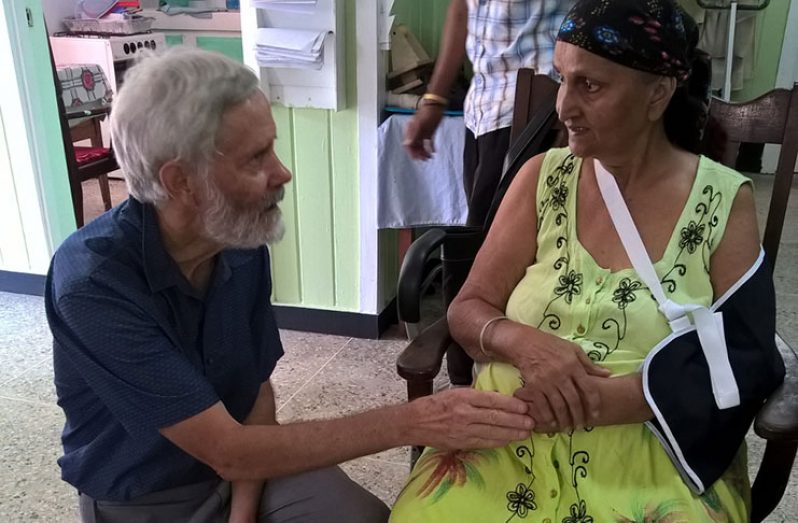…Guyana to have six therapists by next year
OCCUPATIONAL Therapy (OT) in Guyana is hardly known, but thanks to visiting OT from the

United States of America, Mr. David Thomforde, Guyana can expect to have six local students of the University of Guyana (UG) trained by next year.
Thomforde, originally from Los Angeles, is here in Guyana for one year as a volunteer for the U.S. Peace Corps and apart from lecturing at UG, he works with patients at the Palms Geriatric Home, while at the same time helping to train others in becoming occupational therapists.
“Other students who are in their fourth year of occupational therapy training are here to practise under my guidance. So next year when they graduate, they can work with patients on their own,” he told the Guyana Chronicle in an interview at The Palms on Brickdam.
Thomforde is the only OT in Guyana at the moment, although there are OT technicians who have a lot of experience in the field. One of the students practising under the guidance of Thomforde, Ms. Deoranie Babulall, also sat in on the interview and explained that OT is a holistic client-centred approach that sees a patient being evaluated in every aspect of his life.
It takes into account their environment and their ability to function and do the activities of daily living such as grooming, self-care, bathing, dressing, cooking, etc.
“Occupation is anything you do; it’s not just a job. A lot of people think occupation is your job, but occupation is everything you do from the moment you wake up to when you are ready to go back to sleep. So we address any interference to those activities; whatever it is that is preventing you from functioning normally,” Babulall explained.
“Apart from physiotherapy, which focuses on rehabilitating the body, OT gets into the details and fine-tuning — so to speak– of what a person’s needs are. “Even the person with a disability can get back into the working world; we can adjust the working environment for them,” Babulall noted.
Occupational Therapy is also needed in schools, as conditions such as Attention Deficit Hyperactivity Disorder and autism, among many other disabilities, have become popular. “With OT, we can start from as young as the nursery age so as they grow into adolescents, they will not have such a struggle. So it’s really, really important for Guyana,” she said.
Babulall is one of the Guyanese who was unaware of OT and started at UG with the goal of becoming a physiotherapist. For Career Day, though, when she was asked to do an awareness programme on OT, her in-depth research taught her how important the field is to Guyana.
“It’s a field of therapy that is really needed in Guyana and it would be nice if other persons can become involved in it. About five of us are expected to graduate in 2017. So from having no occupational therapists in the country, we will have about six, because one person has already graduated,” Babulall informed.
Afeeza Khan, another student in training at The Palms, also sat in on the interview and shared that she too found the field to be important and interesting.
“It’s an interesting field and there’s not a lot of persons who know the difference between an occupational therapist and a physiotherapist; it’s a field that deals with the person as a whole. So it’s not about just getting them back to functionality, but it’s about getting them to do what they want to do as much as possible,” Khan offered.
Meanwhile, Thomforde rejoined and noted that OT can have both an economic and psychological benefit to a family.
“Looking after someone with disabilities can take someone out of the economy— so to speak — because they have to care for that person. So OT, helping to restore someone to their normal functions and to independence, can relieve a family from the need to take care of the person.
“From an economic point of view, when a mother has to look after a child with disabilities, she can’t work outside of the home or she can’t pay as much attention to the other children. So when we can help people with disability regain independence, then it has an economic benefit, a psychological benefit, and the family dynamics can improve,” Thomforde said.




.png)









